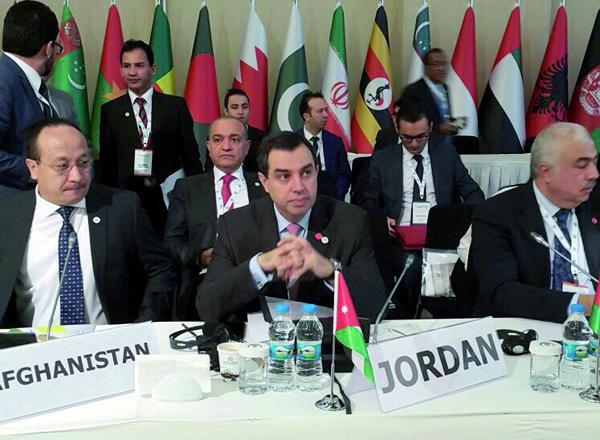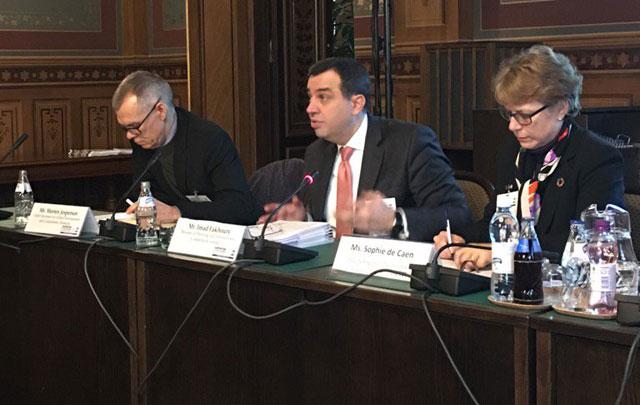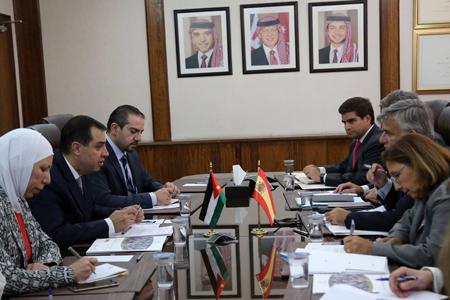You are here
Refugee crisis a grave issue of national resilience — Fakhoury
By JT - Nov 28,2015 - Last updated at Nov 29,2015

Minister of Planning and International Cooperation Imad Fakhoury attends the 31st session of the Standing Committee for Economic and Commercial Cooperation of the Organisation of Islamic Cooperation in Istanbul last week (Photo courtesy of Ministry of Planning and International Cooperation )
AMMAN — The crisis brought on by the Syrian conflict is not a refugee issue alone; it is also a grave issue of national resilience, especially for the neighbouring countries that absorbed Syrian refugees, according to Minister of Planning and International Cooperation Imad Fakhoury.
Speaking at the 31st session of the Standing Committee for Economic and Commercial Cooperation of the Organisation of Islamic Cooperation
(COMCEC) in Istanbul last week, Fakhoury said the protracted crisis has brought devastation to the whole region and challenged even Europe.
“Such crises cannot be resolved except through political solutions that are accompanied by firm international commitments to alleviate the effects of the crisis. The Syrian crisis, which is now in its fifth year, resulted in 4 million refugees in neighbouring countries, in addition to 8 million internally displaced people,” a ministry statement quoted him as saying at the meetings.
The minister added that Jordan is currently hosting more than 1.4 million Syrians, with only 8 per cent living in refugee camps, according to the statement, released Saturday.
This has greatly affected the financial and economic situation of the country, as the total financial effects of the crisis, including direct and indirect costs since 2011, are estimated at $6.6 billion.
These estimates, Fakhoury said, do not include the costs of humanitarian and resilience interventions, and the additional expenditures on education, healthcare, subsidies and income losses that the government has been enduring since the outbreak of the crisis.
To address this situation, the government is implementing a resilience-based response, which puts together the humanitarian and development efforts in a unified national framework that serves the interests of refugees and host communities at the same time, he said, referring to the Jordan Response Plan, developed in cooperation with the international community and UN agencies.
Participants at the two-day COMCEC session discussed internal trade between member countries and enhancing the role of the private sector.
The minister and representatives of OIC member countries exchanged views on improving and advancing economic and trade cooperation to face global economic challenges, the statement said.
In a speech at the event, Fakhoury said the meeting comes at a time of difficult political, security and economic conditions facing the world in general and the Middle East in particular.
These challenges, he noted, are aggravated by low growth rates and the increase in unemployment and poverty, which requires exceptional efforts to contain challenges and adopt new tools to counter them.
He reviewed the Jordanian experience in paving the way for the Sustainable Development Goals.
“Jordan continues to enhance its path towards democracy, transparency, good governance. It is enhancing integrity, combating corruption and boosting our new democratic institutions,” the statement quoted him as saying.
The minister highlighted Jordan’s recognition of the important role played by the
COMCEC but said economic institutions should not depend on traditional tools in development. They should create, instead, non-traditional solutions in light of the unprecedented challenges to help their member countries bear these burdens.
The OIC should also provide a supportive political umbrella to push the international community to bear its responsibilities towards the geopolitical challenges that the region confronts, and help the countries that are paying the price of their humanitarian, security and legal commitments towards the region and the world, the minister said.
All of those challenges, he reiterated, affect the countries’ ability to achieve sustainable development goals 2030.
On the sidelines of the conference, Fakhoury held bilateral meetings with the OIC undersecretary, the Kuwaiti and Egyptian delegations and the Turkish ministers of economy and development to discuss bilateral relations and ways of enhancing mutual cooperation.
Related Articles
AMMAN — Jordan is depending on donor countries to shoulder the commitments announced in the London conference to support countries hosting S
AMMAN — Planning and International Cooperation Minister Imad Fakhoury has participated in an international conference in Helsinki to discuss
AMMAN – Spain has listed financial aid to Jordan as a priority for development support extended by the European country, according to Minist
















